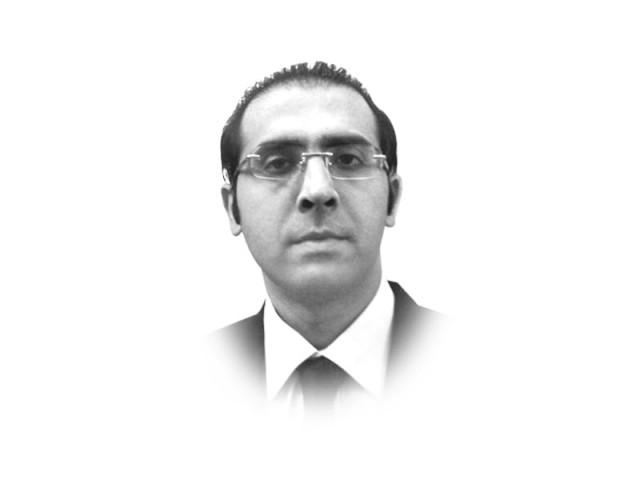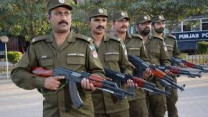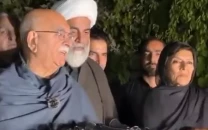The price of freedom
The murder of Saleem Shahzad stabs the extremely private prerogative of individual opinion.

The price of freedom
The most perceptible characteristic of fascist tyrannies and ‘demagogies’ is their insatiable yearning for certainty. Monolith narratives and state versions are a necessary corollary of the desire for uniformity and hence necessitate the elimination of those who dissent. Yet a consequence of this certainty is that no elaborate probe is required to ascertain the culprits of this heinous barbarism, the identity of the perpetrators is also known to a moral certainty. To use an imprecise term like ‘agencies’ for these murderers is wickedly generous. This certainly is no occasion for remote implications and fragile insinuations. Intelligence agencies have a history of being accused for harassment and torture of political dissidents, critics of the state and journalists who are not afraid to speak their mind. Words should not be minced. Orwell writing about Gandhi said: “Saints should always be judged guilty, until proven innocent”. We should apply the same principle to our intelligence agencies and they are certainly no Gandhi. In the interest of fairness, on the freak chance that they are guiltless in this particular instance, now would be an appropriate time to make a statement in which they admit to their past shenanigans and put forth the case for their innocence in this particular instance. As a pointer, blaming it on a ‘foreign hand’ is not likely to be helpful, since it would be an admission of incompetence, and we will be back to the uncomfortable though familiar choice between ineptness and complicity.
After Salmaan Taseer, Shahbaz Bhatti and numerous others, writing about another man killed for his views, one feels like cheating on one’s dues, not paying the full price of the ride. Citizens in general and surviving journalists in particular should take offence. Not only because their fellow citizen or colleague was murdered, but also because they are not considered significant enough to be targeted, which in itself is a scathing indictment. Merely being alive has become a sign of weakness — it is, or at least should be, shame inducing.
Saleem Shahzad was silenced because of his ostensible attempt at exposing a nexus between al Qaeda and the top naval leadership. Whereas one cannot be certain about the factual accuracy of his claims, as a matter of principle now his argument should be broadcasted loudly and vigorously. I never knew Saleem Shahzad, although I wish I did since he must have been doing something right. As a tribute to a free speech martyr, his version should now be presumed true, unless proven otherwise. If a detainee was mildly injured due to alleged police torture in the tiniest, farthest, far-flung area in Pakistan, and the episode was given television or print coverage, one would have very good betting odds that the activist Supreme Court would take suo motu cognisance of the matter, and probably summon the inspector-general police of the province just for good measure. One would imagine that the Supreme Court should, applying this flawed but widely practiced principle, have no problems in summoning the director-general of the ISI to explain the position of his agency in the incident. Not a major or a colonel but the director-general, who is not superior in rank to a federal secretary and has not even a mildly legitimate claim of immunity. However, it is evidently inevitable that My Lords just might find themselves suddenly inundated by previously dormant but now urgent matters.
Recently, I came across an observation made by the late Salmaan Taseer’s incredibly brave daughter regarding the fact that none of the top brass of the military offered their condolences on his murder. I stand to be corrected here, but I do not recall any member of the superior judiciary publicly offering condolences to the nation or the family either. The laziness of the mainstream media in missing this glaring omission is deviously suspicious. Similarly, the abduction and murder of journalists and political activists in Balochistan is accorded less space than silly frolics of second-rate cricketers. I do not for a moment suggest that the journalist community is to be blamed in any way for this vicious attack. However, selective courage perpetuates hegemonies, rather than destroy them.
One dearly hopes that the realisation is present of what is at stake here. Not to romanticise it too much, but it is an assault on our basic integrity. The murder of Saleem Shahzad should be insulting to all of us at a very individual, personal level. It is not only the crude threat of physical violence by a demagogy but also a stab on the extremely private prerogative of individual opinion. The cynic will say that we never had that right. Well, the cynic is wrong, and Saleem Shahzad proves this, only the price, of that right is outrageously high.
Published in The Express Tribune, June 2nd, 2011.



















COMMENTS
Comments are moderated and generally will be posted if they are on-topic and not abusive.
For more information, please see our Comments FAQ